#Not that I attract Utena
Text
Thinking about how despite obviously being sapphic, Utena only ever actually blushes around guys.
Blushing is a sign of someone being uncomfortable/embarrassed, yet it is associated with having hard romantic crushes.
Utena is uncomfortable around male characters, which heteronormativity presumes to be an Attraction(tm)
#revolutionary girl utena#shoujo kakumei utena#we live in a society where attraction is supposed to make you uncomfortable and it's not really an attraction otherwise so... yeah#I think this is why some ppl thought Utena wasn't really gay because she is embarresed around guys in a way she isn't around Anthy
58 notes
·
View notes
Text
Just some crappy Mikage drawings based on images from the show cause I need practice... I feel like I'm really getting the devianart experience tryna draw him😅😭

He looks much better in the show I assure you...
[writing on top left says 'Mikage Death Pose' since it looks very simpson death esque; writing for glasses (he looks so cool in his prof outfit) says 'stylish professor turned stylish librarian after pick-up attempt' (cause I accidentally gave him lipstick😅); middle left writing says 'shading fail' and 'dude being shady- not blushy; and bottom writing says 'Gah... She kept me waiting again!']
Favorite's definitely the bottom one
#mikage souji#my art#rgu#revolutionary girl utena#He looks like a sullen teen in the bottom one😁#I know these images aren't great but can you SEE the Scarecrow#like search up photos of this guy and tell me he isn't using his students' anxieties and fear for his sick little manipulation experiments#Oh you can't? Maybe that's because it's FREAKING CANON#Just imagining this guy facing off against The Batman is really funny to me#since I was thinking of RGU as Batman I obviously couldn't help imagining the inverse#where Batman is Utena and Crane is Mikage#but it's a bit harder trying to pin who would be who that way#it's hard enough trying to decide who's which Rogue for Utena...#like what am I supposed to do for Miki -_- only thing coming to mind is Riddler... RIDDLER! Isn't that awful? So back to the drawing board.#but that being said Riddler might be a good Miki in the inverse. Genius who's condescended to for his age; doesn't quite fit with the other#If it wasn't for his personality I'd say maybe Catwoman could replace Miki...#but the inverse's biggest issue is the Rose Bride#if I was doing BTAA specifically Harvey could be the Rose Bride no problem#But I don't know how that would hold up against other iterations of him#and Poison Ivy is a human plant who attracts people but is also very independent and in control#which would be interesting putting her in that role since Anthy is kinda like that on the inside🤔#but then Akio is an issue so it's a whole mess I'm trying to untangle. I've mostly got the Utena ones down#but it'd be nice to get more hard hitters in it that just don't seem to fit like Oswald
27 notes
·
View notes
Text
Normal about the fact that in rgu there's no blood shown in any scene no matter how severe the injury is except for the time Juri bit Ruka
#Normal about it#You know how everything in rgu is staged to be perfect? roses in every frame and everyone is conventionally attractive#And no one bleeds when they are hurt and the violence is all censored and sugarcoated as 'that's just the way things are'#Juri breaks those rules by not confirming to ohtori standards. She's beyond the reach of the narrative's censorship in a way#I hope this is comprehensible. I would appreciate hearing other people's takes on this#rgu#revolutionary girl utena#shoujo kakumei utena#juri arisugawa#very reliable posts
59 notes
·
View notes
Text
a guy in my dms is trying to hit on me while i'm binge watching utena... brother take the hint
#i feel so bad for him i'm just herw bawling my eyes out over utena and anthy and he thinks i'm attracted to men 😭#man i have to come out officially i can't deal with this shit no more#revolutionary girl utena#rgu#op
12 notes
·
View notes
Text

I'm not going to get into my own opinions on Sai's takes because it's not relevant to the point I'm going to make, but Lily saying that Sai saying that Utena was in love with Akio is Sai saying that Utena is straight is fucking wild.
Lily Orchard does not understand bisexuality... which is weird, considering she's bisexual.
#one could argue whether or not utena is actually bisexual#but i'm someone who believes that any sexuality reading of utena is valid so long as she's attracted to women#i think how utena is read in that regard is often deeply personal and also think stepping on those personal reads is fucking pointless#i don't like the bi/pan utena vs lesbian utena debate very much can you tell#also yes the 'lily orchard does not understand bisexuality' thing is a reference to the ask this post is replying to why do you ask
9 notes
·
View notes
Text
imo both answers make sense in different ways, i could see her crush on akio as genuine feelings being used against her or as comphet + being overwhelmed/anxious around him and interpreting that as feelings (also she is being groomed to like him it's very calculated on his end). the only wrong answer here is straight utena
#rgu#revolutionary girl utena#utena tenjou#im in camp lesbian utena because it really does feel like shes being swept up in wanting to be normal#and has strange ideas about romance and is being heavily groomed into having a crush#both with akio and touga really#but then again i can still see bi utena cause it could be genuine attraction that the men are using to hurt her#that happens often irl#ik this question has been debated a lot im just curious what the general tumblr utena fan consensus is#gootpost
26 notes
·
View notes
Text
I was so happy abt gender and sex stuff earlier but then i found a femme lesbian being a femme lesbian and it’s given me indigestion
#i dont see this magical mythical space where femmes arent welcome#or dont exist#i certainly dont see any BUTCHES spurning femmes (as if butches as a whole dont drastically prefer being w femmes)#i DO see a lot of femmes that are for femmes#and call butches ugly and mannish and all kinds of hurtful thing#(im a mannish butch actually)#(but not everyone wants that term to describe them)#and DONT get me started on how all the examples of ugly masc lesbians are all#coincidentally#black or brown#i am attracted to femmes and all#but some of yall are fucking disgusting#and i hope u never find peace and acceptance for as long as u hold onto that hate#that different brand of misogyny#that only butches and studs know#using the same cutting words as the ones who we both run from#and its really sad that a lot of butches specifically bc of some#utena shit#knight in shining armor shit#and thats kind of an unsaid part of the culture
3 notes
·
View notes
Text
and i have to specify this is esxclusively abt design ie not real people not even characters played as actors bc those are still real ppl w traits that dont have to be justified. you literally can draw ppl however you want and make it as normal or weird as you want, stylize them as you want, esp bc it simply wont get to the level of nuance that real human interaction does.
you wouldnt feel weird trans female character with a microns-larger nose than average if you drew literally any other female character with smth that isnt the same 2 faces.
#txt#and i say this bc unless its like utena levels of stylization where everyone has the same face anyway. without a fail it is likelier that#any author while not having the biggest variety of male character design will simply have more relative to female characters.#and so to solve this problem if the trans character is not introduced as so inmediately but later on as idk a reveal or smth#A. they make them Thee most undeniably feminine You Wont Find A Single Masculine (whatever a mangaka that is sexist anyway considers#that to be) trait on them prettier than Any woman type of guy from the beginning B. not so much like that but they progressively erode#their traits not even bc of the characters active choice in any way or C. they dont do either but they leave said character in the backgrou#and like point A. is just ? kinda whatever were not bc yk it's this kind of subconscious overcompensation relative to the very limited#range of female characters mangaka do or consider appropiate/attractive.
1 note
·
View note
Text
Revolutionary Girl Utena: Gender in Context
beneath the cut, I discuss the RGU's portrayal of gender in the context of 1990s Japan.
in Ikuhara's interview with Mari Kotani, he stated that in traditional Japanese society, "prince" meant "patriarch." the same is true in Western societies--there was a time when a prince would be an heir to a royal line. by 1997, this meaning had died out of large parts of the world. even the association between princes and traditional masculinity was fading. Saionji, the weakest, most pathetic man in the show, is a parody of historical Japanese masculinity, with his kendo and his blatantly regressive beliefs about women.
in RGU, prince may still mean patriarch, but in a far more subtle fashion. Ikuhara and Kotani discussed the changing expectations for men in the latter half of the 20th century--it became gauche to fight over a woman with one's brawn, so instead, power struggles were played out in the arena of looks and sex appeal. one can see this reflected in the character Akio, whose power as a prince arises from his ability to turn "easy sensual pleasure based on dependency" "into a selling point with which to control people."
Akio has his moments of showboating masculinity, but when preying on Utena, he operates by making himself seem non-threatening and soft.
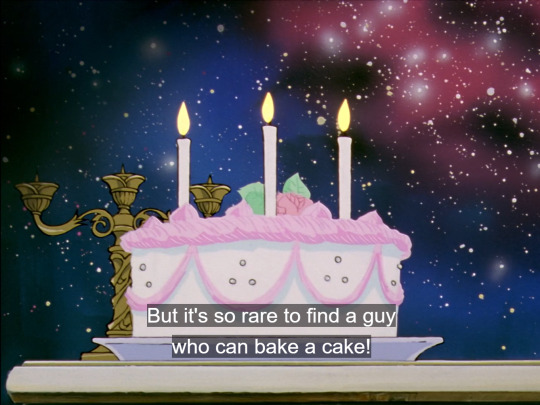
not only that, but he purports to want to allow students to express their individuality and thus approves of Utena's masculine form of dress. this is a front--by the end of the show, he's telling Utena that girls shouldn't wield swords. thus, through Akio's character, the show argues that traditionalist patriarchy in Japan isn't gone, but instead has only been papered over with false progressivism.
with all that said, there seems to be more to the character. he's taken the family name of his fiance, Kanae, and whatever material power he has in the school is dependent upon her family. in Japanese society, this is considered a humiliating position to be in, something that only a shameless man would do. the show never gives the audience any insight into how Akio feels about this--is he unbothered entirely, or are his actions against the Ohtori family an expression of his repressed anger? does he harm the children under his care to compensate for his humiliation?
this aspect of Akio's character may seem irrelevant in light of the larger, immaterial social forces at work in the show. however, I would argue that it was included for a reason. Akio, despite his status as ultimate patriarch of Ohtori, is in fact a highly emasculated character, to the point where lead writer Enokido even said that he is driven by an infantile mother complex.
to explain why Akio was portrayed this way, we have to discuss Japanese history. the nation suffered a major defeat in WWII and was forced to accept whatever terms the United States laid out for it. for an examination of how the Japanese have never truly processed those events and have plunged into modernity with reckless abandon, I recommend Satoshi Kon's Paranoia Agent. to sum it up briefly, in a very short period, the nation regained its economic footing, and by the 1980s had the largest gross national product in the world. this economic boom may have allowed Japan to maintain a sense of sovereignty, dignity, and power, but it was inherently fragile.
the infamous "bubble economy" lasted from 1986 to 1991. during this time, anything seemed possible; financial struggles appeared to be a thing of the past, and capitalist excess reached new heights. the ghosts of this period can be felt across Japanese media; for instance, think of the final shot of Grave of the Fireflies (1998), where the two dead children look down on Kobe, glowing an eerie green to imply its impermanence. the abandoned theme park from Spirited Away (2001) is explicitly referred to as a leftover from the previous century, when many attractions were built and then tossed aside in a few short years.
the bubble popped in 1992, leaving an entire generation feeling cheated. the bright futures they'd been promised, which had actually materialized for their parents and older siblings, had been lost to them overnight. economic crises are often accompanied by gender panics. to quote from Masculinities in Japan, "The recession brought with itself worsening employment conditions, undermining the system of lifelong employment and men’s status of breadwinners in general. The unemployment rate was rising, and although it never reached crisis levels, men could no longer feel safe in their salaryman status. Their situation was further complicated by the rising number of (married) women entering the workforce."
with this in mind, Akio's character can be taken as a representation of masculinity in crisis in 90s Japan. he's forced to rely on women for his position in life and has failed to save his only relative, Anthy. he tries to escape his misery through hedonism, perhaps an allegorical representation of how men tried to maintain their old standard of living after the economic bubble burst.
but of course, Akio is not the main character of RGU--the story is about girls. mangaka Yamada Reiji discussed the series in the context of the 90s, stating the following:
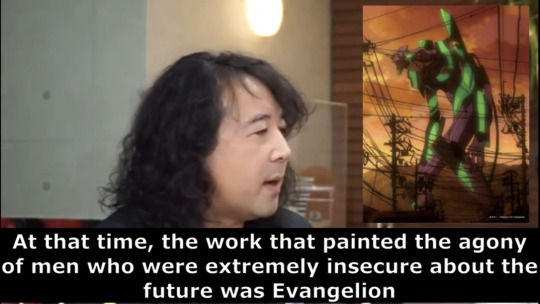
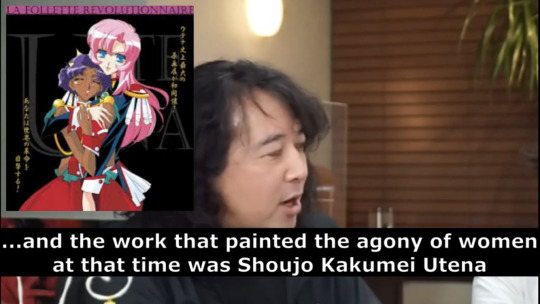
while I opened this essay by discussing the prince, the same points could be made about the princess. despite the increasing irrelevance of royalty, princess is still an important concept. how does it relate to the socioeconomic landscape of the 90s?
in Yamada's view, RGU is full of relics of the 80s; for instance, the figure of the ojou-sama, an entitled young woman who never lifts a finger for herself. during the economic bubble, it was increasingly common for women to be entirely taken care of by the men in their lives. Yamada names Nanami as a clear ojou-sama type character: she weaponizes her femininity, demanding to be rescued, doted on, and served.
however, by 1997, the ojou-sama could no longer expect to get what she wanted. from the 80s to the 90s, the percentage of women in the workforce increased around 15%; it was no longer viable for most women to be "kept" by their families. as the men experienced the humiliation of not being able to provide for their wives and children, women were undergoing a disillusionment of their own.
Yamada blames Disney for creating the ideological structure which led women astray. obviously, the company is known for its films about princes rescuing princesses. in Yamada's recounting, during the 80s, the company was infiltrating Japan through its theme parks as well; across the country, Disneylands were opening up, and people were buying into the escapism the corporation offered. Japan, as America, became a country of eternal children. its people were waiting for a prince to appear and save them.
but fairy tales can't stave off reality forever. Yamada claims that RGU embodies the rage of young women who woke up one day and realized that they had been raised on a lie. this anger pervades the work from beginning to end.
though RGU was created in a particular social context, its lessons can be extrapolated to any time and place. as the first ending tells us:
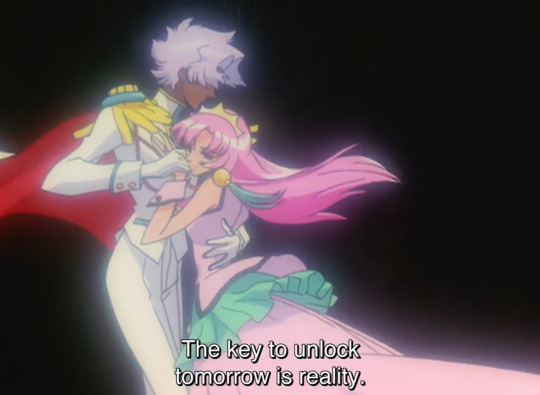
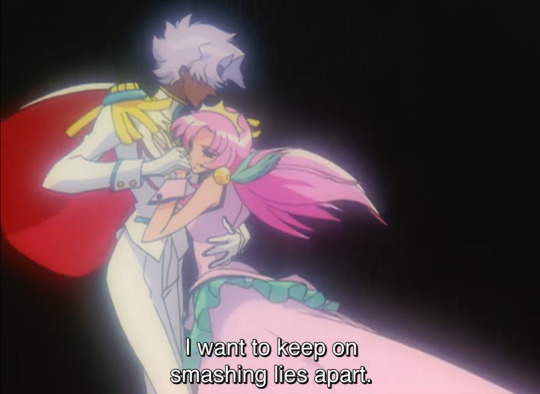
I hope this essay helped provide more context for the series. thanks for reading!
#rgu#commentary#revolutionary girl utena#this was originally a part of another essay but i revamped it and added a lot more detail
667 notes
·
View notes
Note
can you pleeeeease post your dm sexuality/gender hcs on here.... 🥺 i don't have a twitter but i wanna know. it's like a pandora's box to me now i'm like scratching at the door. let me in
heres the link 2 the thread (mild spoilers btw) ill post a transcript under the cut for ppl who dont have twitter
first off i think laios relationship to sex is super removed for like 50 reasons without even getting into his actual sexuality
he grew up in a place with very repressed ideas about sex and has a lot of fear about asserting his presence in situations
his special interest takes precedent over any social interactions he has and the level of closeness he feels towards people
he has a hard time figuring out his feelings towards other people both bc hes autistic and bc he has freaky deviantart fetishes that make sex in his mind a very abstract concept <- this one is me projecting mostly
that aside, i feel like gender-wise hes attracted to ppl so infrequently it may as well be entirely case-by-case
the idea of him being gay appeals to me from the 'raised with traditional values he Does Not fit into/hasnt begun to question it yet' perspective, i lauve characters who put a lot of stock into performing a role thats expected of them and fail miserably for unknown (gay) reasons
from his perspective tho i dont think he would ever really label himself anything. hes going to pride parades in the shirt+shorts Ally Fit to clap for his friends
hes also 'cis by indifference' imo... i love tmasc laios hcs it just doesnt mesh w his personal history to me. i do think hes got some kind of therian gender thing going on (not trans or nb but a secret third thing) but i cant see him changing anything abt his appearance/pronouns to accommodate that post-canon. hes just doin his thang
falin is in a similar boat for gender. i LOOVE tfem falin but the village repression thing has been bugging at me so i dont think i subscribe to it anymore (canon purist sorry) BUT if u hold that hc i am clapping and cheering regardless
instead i was propagandised to a while back and i LOVEEE the idea that being fused w a male dragon and the residual traits she has after being revived have given her a type of gender euphoria she didnt realise she was missing. a little boygirl swagger if u will
sexuality-wise i also dont think she would care to label herself, shes a lesbian by virtue of only being interested in One woman and zero other people. without marcille i do think shes still exclusively attracted to women, and i like to imagine she might experiment around a bit during her travels post-canon (pre-relationship). hearing abt it might put marcille on the news though
marcille is very simple That is a transfem lesbian. she cant get pregnant, shes obsessed w being femme and all that combined w her half-tallman struggles to be seen as 'properly feminine' by elf standards reads very transfeminine to Me. also her bookboy crush REEKS of comphet its not subtle
i think a more comfortable marcy might have the space to experiment w being elf butch like her manga boys but thats mainly self indulgence for me. utena could have saved her
senshi is gay his whole thing is abt not being able to perform dwarven masculinity to a proper standard (soft hearted, not as strong or rugged as his peers) which is like gaycoding 101. also hes a bear. homosexuality be damned by boy can work a grill
adding onto this i rly think senshi got some type of euphoria from being an elf in the changeling chapters. he was feeling himself so much i think he was using it as an outlet to have fun being a little fem and fruity without needing to justify it. do u understand
i dont have any particular opinions abt him gender-wise beyond that. his bulge is an essential part of his character design but i also saw a transmasc senshi a couple days ago that made me nod my head thoughtfully so i could go either way
chilchuck is cis and bisexual this is just canon. not even just his old man crush on senshi altho i do think thats very funny but they put his ass on a cover themed like hes in a dating sim with all the men and women in the cast and then slapped it in front of a chapter called "bicorn". i simply cant pass up that kind of overt signaling. its so fucking funny what else is there to say truly
izu to ME is a transmasc aroace lesbian (this one has the least basis in canon i just know it to be true) shes a little genderfluid with it nd uses he/she i think. i like to imagine she consistently uses masculine personal pronouns to refer to herself either way tho (boku, ore)
i think izutsumis gender/sexuality is entirely secondary in priorities to her body dysphoria. she has a lot of learning and acceptance 2 do before that kind of self discovery is on the docket and in my mind eschewing gender on some level is part of that. get sillay
shuro is cishet but at least he feels bad about it. next listen listen to me i dont think he would ever actually examine this but i need u to put on ur tin foil hat with me for one second. i think estrogen could have saved her. i have more thoughts on this but im not gonna propagandise too much on this post just know that im right
kabru is a transmasc bisexual this is also practically text. his whole thing of being treated like a doll by milsiril to put in pretty dresses, plus i think it would be pretty easy for him to stealth in the west since tallmen are seen as inherently more masculine than elves
(i also think changing genders is just more common for elves. theyre androgynous enough that it wouldnt be hard and like who in their right miiiiind would be the same gender for 500 years. dwarves too)
i think he started presenting as male socially in the west but didnt need to consider medical transition until he moved to a more mixed culture where other races might see him as a woman
i dont have to explain the bisexual part. have u seen him
namari is a butch bisexual this is just canon straight up. shes not transmasc but i think the default settings for dwarven women is like 4 years of T regardless. shes a hit at all the local cruising spots despite her renfaire nerdisms i know this
and just bc im thinking abt em kiki and kaka are identical and kiki is tfem :} theyre both attracted to women but kaka is a sub so i forgive him
THATS ALL 4 NOW theres a lot of characters so i cant have thoughts abt all of them at once but i hope this was good. im right about everything forever as per usual
656 notes
·
View notes
Text
to be honest, I think naming the main character of Gushing Over Magical Girls Utena, as in Revolutionary Girl Utena, is a fucking *inspired* choice. Like, yes, put your smut on the same level as high art. Dare us to evaluate it against such a thematically rich juggernaut of a story. The sheer confidence to invite that comparison is one thing, but the fact that it actually kind of works is another beast entirely. After all, both Utenas are young lesbian magial girls struggling with a desire for power, and wondering whether they're attracted to other girls in the right way. I'm not saying Utena Tenjou would definitely be into BDSM, but she canonically has some complex feelings about power dynamics. The more I rotate this parallel in my mind, the more I think it works, actually.
499 notes
·
View notes
Text
Is Juri's problem really idealizing Shiori in some way? The prevailing interpretation I've seen is that Juri should accept she fell for a snake so she can remove Shiori from the pedestal of her love. Incidentally Ruka also shares this opinion. I disagree and I'm here to be a contrarian about it!
A nonzero number of takes base their "Juri idealizes Shiori" conclusion on the "innocently cruel" line, the interpretation being she's percieving Shiori's personality as sweet and innocent. But that's not what the line is getting at. Juri's emphasis here is not innocence as a synonym for purity, it's innocence as a synonym for ignorance and naivety. Both Utena and Shiori are "innocent" because they are unable to anticipate the queer dynamic, the deviant lesbian desire, that Juri is operating from, and "cruel" because, in their misunderstanding, they step on Juri's toes in unintentional ways.
Even though we, the audience, know in retrospect that Shiori meant to fuck Juri up, the exact way she did it was a freak accident, and at this point in the story she has no idea that she managed to hurt her. Shiori is operating from a different understanding, one that assumes Juri's absolute conformity to and supremacy in heteronormative gender roles. Shiori's whole mission is proving her value over Juri on that axis, obviously because as a suppressed homosexual she feels insecure about her continuing obsession with Juri. She assumes "beating Juri" at attracting men will balance the scales-- render Juri's image less appealing, and hers more. And of course that would hurt Juri, who must value her success with boys so much. That lack of awareness is what Juri is referring to, and she's right here actually, about both Shiori and Utena-- they are unable to conceptualize desire for other women as a potential outcome, and in part it's because of this that they end up harming themselves and others.
Moreover the "innocently cruel" line does not imply that Juri thinks Shiori is an innocent person because, if anything, Juri does nothing but doubt Shiori throughout the series.
At no point does Juri say anything positive about Shiori's personality or their friendship. She is unable to frame her ex-bestie's existence outside of the pain she's caused her. The narrative purposefully never tells us why she fell in love with her in the first place, or what their friendship was like. We don't know why she chose Shiori specifically, and that's part of the mystique of Juri's feelings and of their relationship, that the audience will never see who Shiori is outside of Juri's heartbreak. She could have a vibrant personality, but it's thoroughly obscured by the opacity of Juri's despair, and Ohtori 's miasma. Not to mention Shiori's own internalized homophobia, compulsory heterosexuality, and chosen constructed persona-- just like a lot of other bitches trapped in Ohtori. This is what the place does, it chews up queer teenagers and doesn't spit them out so much as it arranges them neatly into a series of possible stage roles.
Juri's current image of Shiori is of a witch. It's possible she used to think of her as a princess, sure, but then she inverted the role once Shiori acted out. If anybody's idolizing anybody, it's Shiori. She is the master of rendering other people into shining beacons!
I have more thoughts forming on how Juri's "casting" of Shiori plays out through her final duel (does Shiori's mistreatment by Ruka briefly return her to her role as a princess to Juri's gallant prince-- but this proves unsustainable or undesirable, because princehood makes her too vulnerable or liable to corruption?) but they're half-baked at this time.
I do think though that Juri's "miracle" might be "making [Shiori] understand [her] feelings" literally-- not necessarily having Shiori return them (though that idea looms over her including in her understanding of what a man could do in her place, thanks to Ruka for the reminder). The miracle may be finding some way for Shiori and others to understand who Juri actually is without making herself vulnerable or diminishing the ease with which she moves through the world. She doesn't want to get stabbed with those swords of hatred. So many people don't seem to understand her, yet Juri is terrified of embodying anything other than an impenetrable image of excellence...! Girl watch out!! You're just embodying the reason why Shiori resents you in the first place!!! Those swords are coming at you no matter what!!!
394 notes
·
View notes
Text
Is Mobile Suit Gundam: The Witch from Mercury the first anime series to depict a married same-sex couple?

Given the rings and comments from the staff (excluding Bandai) it's pretty clear that both Suletta and Miorine are married. And looking at older anime couples I can't find another one where the characters are actually married to one another.
There are series that depict engagements and proposals (implied or otherwise with queer characters).
Some examples would be:
Yuri & Viktor from Yuri on Ice, where it's implied that they want to be engaged.

Ranma & Akane from Ranma 1/2, both find themselves in an arranged engagement but end up falling for each other anyway. Ranma is canonically genderfluid in both the anime and manga and Akane is attracted to Ranma as both a man and a woman. And this is ignoring all of Ranma's other fiances who know about their curse and want to be in a relationship with them anyway.

Utena & Anthy from Revolutionary Girl Utena, while the circumstances of their engagement are out of their control, the two of them fall deeply in love with one another despite that. And in the movie they kiss.

Other LGBT anime couples are together or in love but next explicitly depicted as engaged or married would be:
Michiru Tenou & Haruka Kaiou from Sailor Moon, they are very much together and in the Crystal series end up living together and adopting a baby.
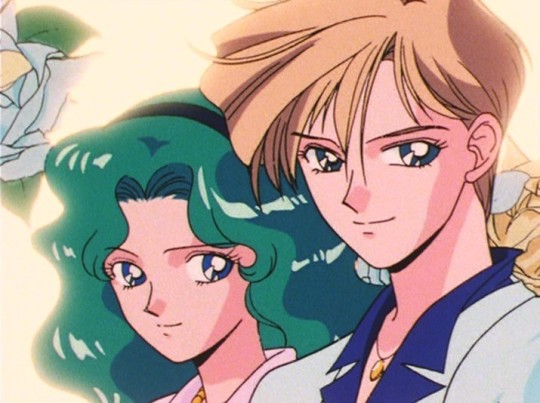
Yukito Tsukishiro & Touya Kinomoto from Cardcaptor Sakura, who are in love with one another.
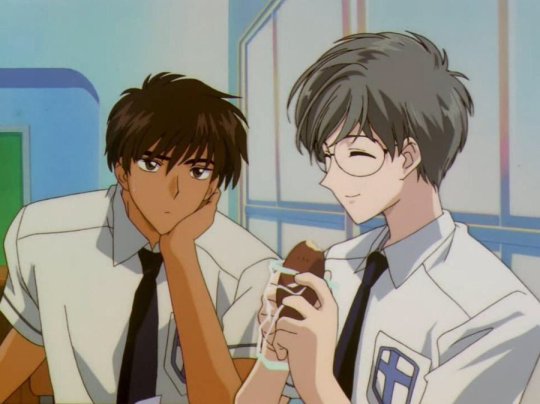
Eiji Okumura & Ash Lynx from Banana Fish, who are in love with one another. And it hurts.

Yuu Koito & Touko Nanami from Bloom Into You, who are two girls who fall in love with one another. And in the story you watch them grow and get closer.
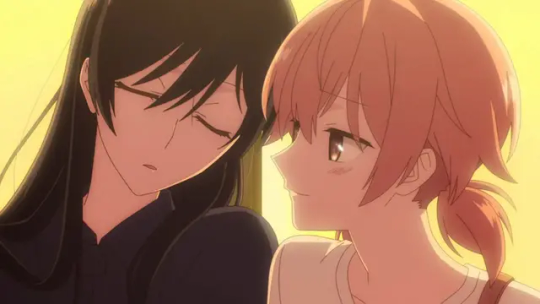
Nezumi & Shion from No. 6, a sci-fi drama where two boys fall in love. This one also hurts.

And countless other examples, none of which I could find have the characters taking their relationship further than dating or engagement.
So, is Mobile Suit Gundam: The Witch from Mercury the first married same-sex couple in anime?
On a minor note, there have been several gay weddings depicted in manga.
Some examples would be:
Our Dreams At Dusk by Yuhki Kamatani, which was written by an asexual, X-gender author.
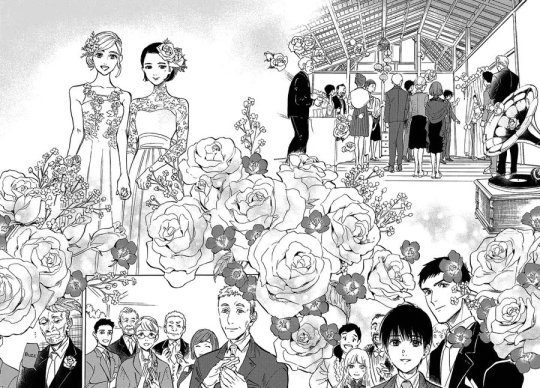
Until I Meet My Husband by Ryousuke Nanasaki and illustrated by Yoshi Tsukizuki. This manga was written by a gay man and based on his own essays about his life. The manga is auto-biographical.
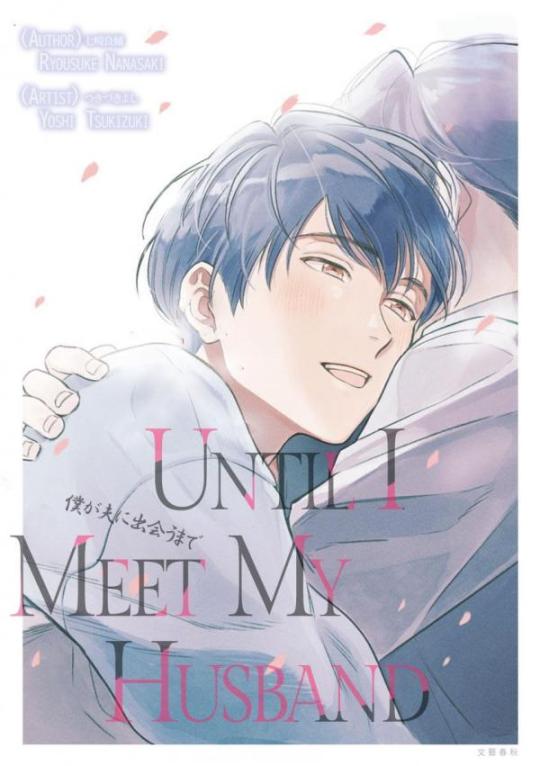
I Married My Best Friend To Shut My Parents Up by Kodama Naoko, who has written several other LGBT manga, most of which are Yuri.
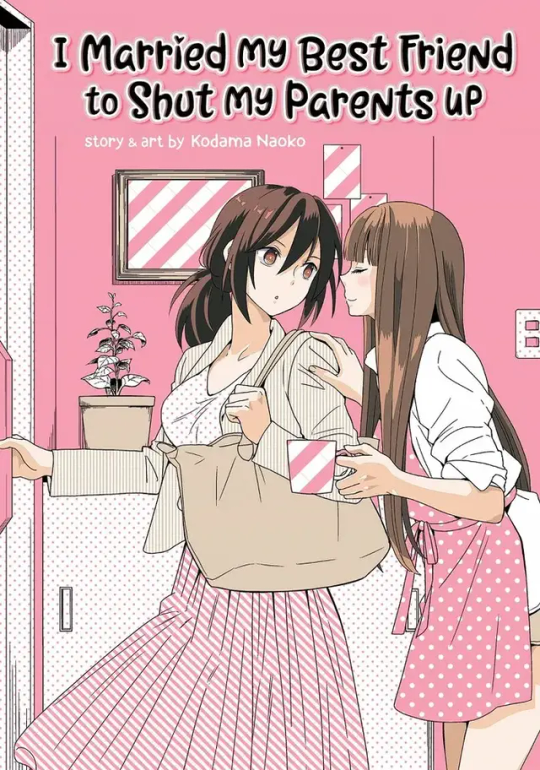
And there are several more!
Bonus:
Shoutout to Episode 7 of the 80s anime Dirty Pair for having a wedding between a cis man and a trans woman in one episode.

#gay marriage#anime#manga#lgbtqia#mobile suit gundam the witch from mercury#ranma 1/2#revolutionary girl utena#yuri on ice#rambles#sailor moon#card captor sakura#bloom into you#no 6#i married my best friend to shut my parents up#until i met my husband#our dreams at dusk#banana fish#dirty pair
816 notes
·
View notes
Text
I’ve always shied away from discussing ikuhara’s usage of incest in utena because it’s quite a sticky topic in shoujo manga and anime but also because those uninitiated with that are likely to assume his using it is somehow perverted and will have a knee-jerk reaction. but I think he’s honestly very clever with it, using it both on a metaphorical level to elicit sympathy for the characters and their romanticised notions of these relationships but also on a literal level to show the dangers and abuse inherent in these kinds of relationships.
nanami is the most obvious example. even though we as an audience may not understand her almost romantic fixation on attracting the attentions of her older brother touga, we can still sympathise with her behaviour on a metaphorical level; she is thirteen, she is lonely, he is her entire world and the world is taking him, and thus her childhood, away from her and she is helpless to stop this. nanami is not perverse, she is trying to secure control over a situation in which she has none. a more common and relatable example is when one feel as though they, their siblings, their parents, etc, revert back to the dynamics they solidified in childhood when they spend time as a family unit. it’s a phenomenon that can be irritating (‘they’re treating me like a child’) but also comforting, familiar, and certain.
yearning to remain in a permanent state of pre-adolescence is something a lot of different characters in utena contend with, albeit in different ways, but hers is so interesting because ikuhara decides she must at one point be met with the reality of what this would mean if taken to its extreme. nanami understands akio is abusing anthy before utena does, and draws strict lines between what those ‘perverse’ siblings are doing and her pure love for touga. yes, she lacks sympathy for anthy outwardly, but her horror at confronting incestuous abuse in a real, unromanticised context, forces her to understand how her innocent outlook can be taken advantage of by people who would mean to do her harm.
and then touga assaults her, and when she rejects him, bewildered, he accuses her: isn’t this what you wanted? of course he can’t understand it’s the absolute opposite of what she wanted to preserve. one could argue here that ikuhara is blaming nanami for her naivety, even punishing her for being so short-sighted. but on the contrary I think he’s desperately seeking our empathy for her here, in showing us that a child’s romanticisation is not an excuse for her victimisation nor her offering consent. and if all we want to focus on is the fantasies of an alienated child, we fail to appropriately condemn abusers from taking advantage of children like nanami.
#it’s complicated by the fact touga himself is only 17 and probably a victim of csa himself#but utena is a messy show that has a lot of perspectives to offer#but I think nanami is so good and I think what he does here is very tasteful#revolutionary girl utena#nanami kiryuu#anthy himemiya#moth.txt
820 notes
·
View notes
Note
You know I read those tweets they keep screaming about where you said "a 14 year old can consent" and... You literally never said that? Not even slightly?? They're the ones wildly misinterpreting you and putting words into your mouth about this. They're the real liars here.
Well it's Twitter, of course they are. Twitter wokescolds will take anything someone they don't like says and twist it into a ludicrous accusation.
What I said was boiling things down to just "Akio raped Utena" is very misleading about how these events play out within the text. And that I used to do the same thing cause I really, really wanted Utena to be a lesbian but in the text she IS attracted to men and she IS attracted to Akio. Akio is the proverbial devil of the story seducing Utena off her path. It's very Faustian.
Funny how Lorch says Twitter is crazy and unreasonable but will use crazy and unreasonable Twitter arguments against me eh?
Meanwhile she can't even answer for her 10 favorite pieces of incest media.
47 notes
·
View notes
Text
while akio’s car is obviously a symbol of sex and sexual violence and the power that he alone wields as the only person who can drive it, i’m not really a fan of the interpretation that “any time someone gets in the car it means they are Literally Actually Having Sex in that moment.” while i do think that it’s probably true some of the time (touga’s first car ride with the “i’m not old enough” line and the car scene with akio and anthy in episode 37 in particular are the ones i read in this way,) i don’t think it’s as straight-forward as that, and generally, trying to decode metaphors to what they Actually Represent in the literal real world is not the most interesting way of approaching analysis to me. i do still think there is significance and meaning to which characters get in the car with who, though, and especially where in the car they sit. specifically i think it says something about the characters’ relationships to one another.
let’s start with the pairs we see sitting in the backseat together. the first are touga and saionji in episode 25, who have a lot outside of their car scene to imply a sexual (or at the very least homoerotic) relationship between them (see the motorcycle scene in episode 36, with similar symbolism to the car.) after that is ruka and shiori in episode 28, who have by far the most overtly sexual car scene, and is probably another one where the sex is literal. last is touga and nanami in episode 32, where touga assaults her (another sexual relationship, although enitrely nonconsensual this time.)
compare that to the characters who sit in the backseat alone: miki and juri. miki is in the car with kozue, but she doesn’t sit next to him, instead she sits in the front seat. this, in my opinion, means that while their relationship does have its weird incestual undertones, it’s never actually been sexual, and it isn’t here either. juri is in the car with ruka, and similarly they do not sit together; their relationship is also not sexual (even though ruka does assault her earlier in the episode, it doesn’t continue in the car.) it’s possible that sitting seperately in the car implies one-sided feelings, but i don’t think that’s likely since there's no implications of that between touga and ruka who do the same thing, and personally i don’t think it’s true for the kaoru’s either. and also, if the positions had anything to do with attraction, touga and nanami would obviously not have been sitting together.
then there’s the front passenger seat, and here the significance is that it’s next to akio. most of the people we see sitting there* (touga, utena, anthy, kozue) are people who are direct victims of akio’s grooming and abuse (the only exception being ruka.) i also think there’s something about how sitting in the front seat feels like it gives you more freedom than the back, even though that’s not true. like you get the special privilege of sitting next to the person driving the car, but you don’t actually get any control yourself.
(*i am deliberately not including wakaba here, because although she does sit in the front seat on her “date” with akio in episode 30, they don’t go to the infinitely looping metaphor-highway at night, and i think that distinction is important. like how utena is in the car several times, but only in that place after akio has turned the relationship explicitly sexual)
#this analysis has been in my notes since before i made this blog and i thought i might as well post it#not entirely sure of everything i've written here but whatever#revolutionary girl utena#analysis#m
159 notes
·
View notes